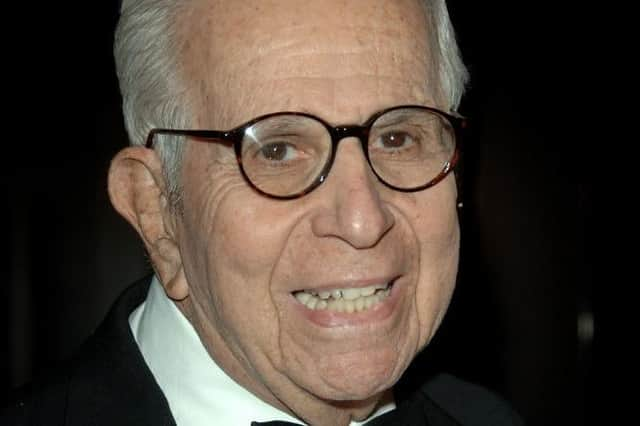Scotsman Obituaries: Walter Mirisch, Oscar-winning Hollywood film producer


The Mirisch Company and Mirisch Corporation are names that should be familiar to anyone who went to the cinema regularly in the late 1950s, 1960s and 1970s for they introduced dozens of classic movies, critical and commercial hits such as Some Like It Hot, The Magnificent Seven, The Great Escape and The Pink Panther.
The son of impoverished Jewish emigrants from Europe, Walter Mirisch started in the film business as a cinema usher and worked as a producer with “Poverty Row” studio Monogram Pictures before setting up the Mirisch Company with his two brothers in 1957. It provided the template for a wave of new “independent” companies that made movies but did not actually own a physical studio space.
Advertisement
Hide AdAdvertisement
Hide AdWith the traditional Hollywood studio system and audiences both in decline, the Mirisch Company were pioneers in big-budget independent production and Walter Mirisch was very much the driving artistic force in the operation. Many of the films he backed were pure entertainment, but others tackled controversial and sensitive themes, including the 1967 drama In the Heat of the Night, with Black actor Sidney Poitier as a sharp detective from Philadelphia drawn into a murder case in the Deep South.
Mirisch is the only person to win a Best Picture Oscar – as principal producer of In the Heat of the Night; the Irving G Thalberg Memorial Award, for an outstanding career in production; and the Jean Hersholt Humanitarian Award. His films garnered 87 Oscar nominations and won 28 Oscars. And at 101 he was the oldest living Oscar-winner, following the death of Olivia de Havilland in 2020.
“I don’t think anybody starts out to paint a masterpiece or write the great American play,” he told the Los Angeles Times in 2008, ahead of an event to mark the publication of his memoirs I Thought We Were Making Movies, Not History. “You try and do the best piece of work you know how. It is only in retrospect that you say ‘My God, how did all of that work out?”
The youngest of three brothers, Walter Mortimer Mirisch was born in New York in 1921. His father was a tailor who had emigrated in 1891, at the age of 17, from Krakow, in Poland, though it was part of Austria-Hungary at the time. His mother’s family also emigrated from Eastern Europe.
Mirisch fell in love with silent movies as a young boy and he decided there and then that he wanted to work in the business. “I think I was five or six years old and I first saw movies and I thought it must be fun to do that,” he said. “Eventually I found my way to the Harvard business school. I thought it would help and it did.”
He worked as a cinema usher in his teens, studied History at Wisconsin University before going to Harvard and spent several years learning the business and getting experience at Monogram Pictures, where his first film as producer was the thriller Fall Guy in 1957. Other Monogram credits include Bomba the Jungle Boy, a Tarzan imitation which Ron Howard said inspired him to follow Mirisch’s career path into movies, and Wichita, a well-regarded western with Joel McCrea as Wyatt Earp.
Mirisch’s two brothers Harold and Marvin also worked at Monogram before they set up the Mirisch Company, a production company with a distribution deal with United Artists. Mirisch supplied United Artists with five of its ten most profitable films between 1957 and 1969. United Artists actually bought the original company in the 1960s, though the brothers went on producing independent movies with various slight tweaks to the corporate name.
Once Mirisch gave a film the green light he would generally leave his directors alone to get on with the job and he had ongoing working relationships with several top film-makers, including John Sturges, director of The Magnificent Seven and The Great Escape, and Billy Wilder, with whom he made eight films, from Some Like It Hot in the 1950s to Avanti! in the 1970s.
Advertisement
Hide AdAdvertisement
Hide AdOther classics from the Mirisch stable include Billy Wilder’s The Apartment, West Side Story, The Thomas Crown Affair and the musical Fiddler on the Roof, a very personal project set against the backdrop of antisemitism in Eastern Europe at the start of the 20th century. There were a few duds along the way, but Mirisch had a good eye for a hit and was not slow to exploit the potential for sequels when it came to The Magnificent Seven, The Pink Panther and In the Heat of the Night. Many of their films were shot abroad, including nine in the UK.
Mirisch served four terms as president of the Academy of Motion Picture Arts and Sciences in the 1970s. In the 1980s he worked largely in television and produced an animated Pink Panther series and a Magnificent Seven series. He also served, in his mid-nineties, as executive producer on the 2016 big-screen remake, with Denzel Washington.
“The American dream is to be president,” Mirisch told one interviewers “I didn’t become president, however I did take advantage of opportunity and luck and whatever talent God gave me, to combine them all and have the career that I wanted to have… I certainly did fulfil that dream.”
Mirisch is survived by three children. His wife Anne died in 2005. They had been married for 58 years. His brothers also predeceased him.
Obituaries
If you would like to submit an obituary (800-1000 words preferred, with jpeg image), or have a suggestion for a subject, contact [email protected]
Subscribe
Subscribe at www.scotsman.com/subscriptions